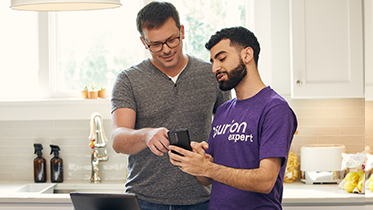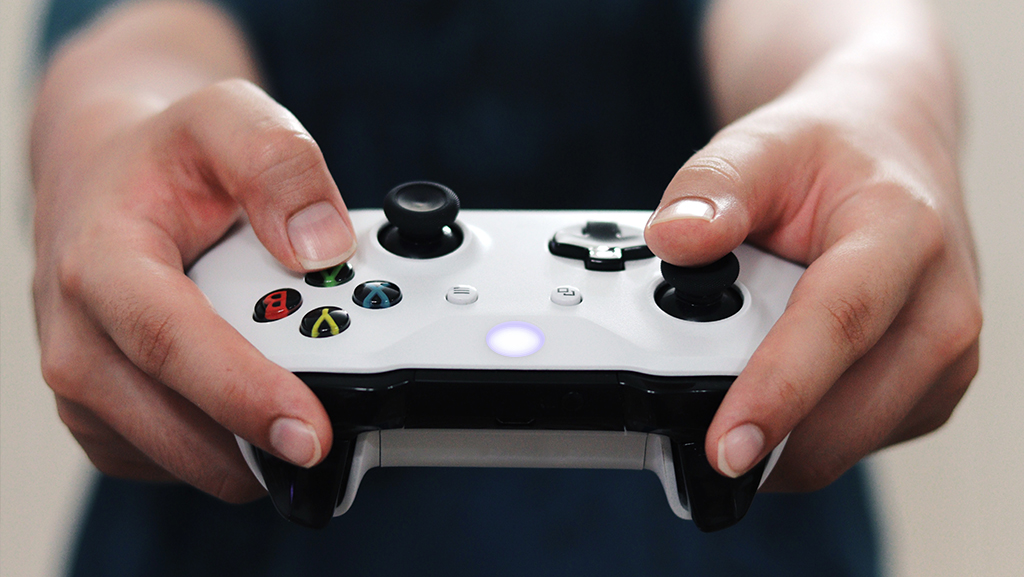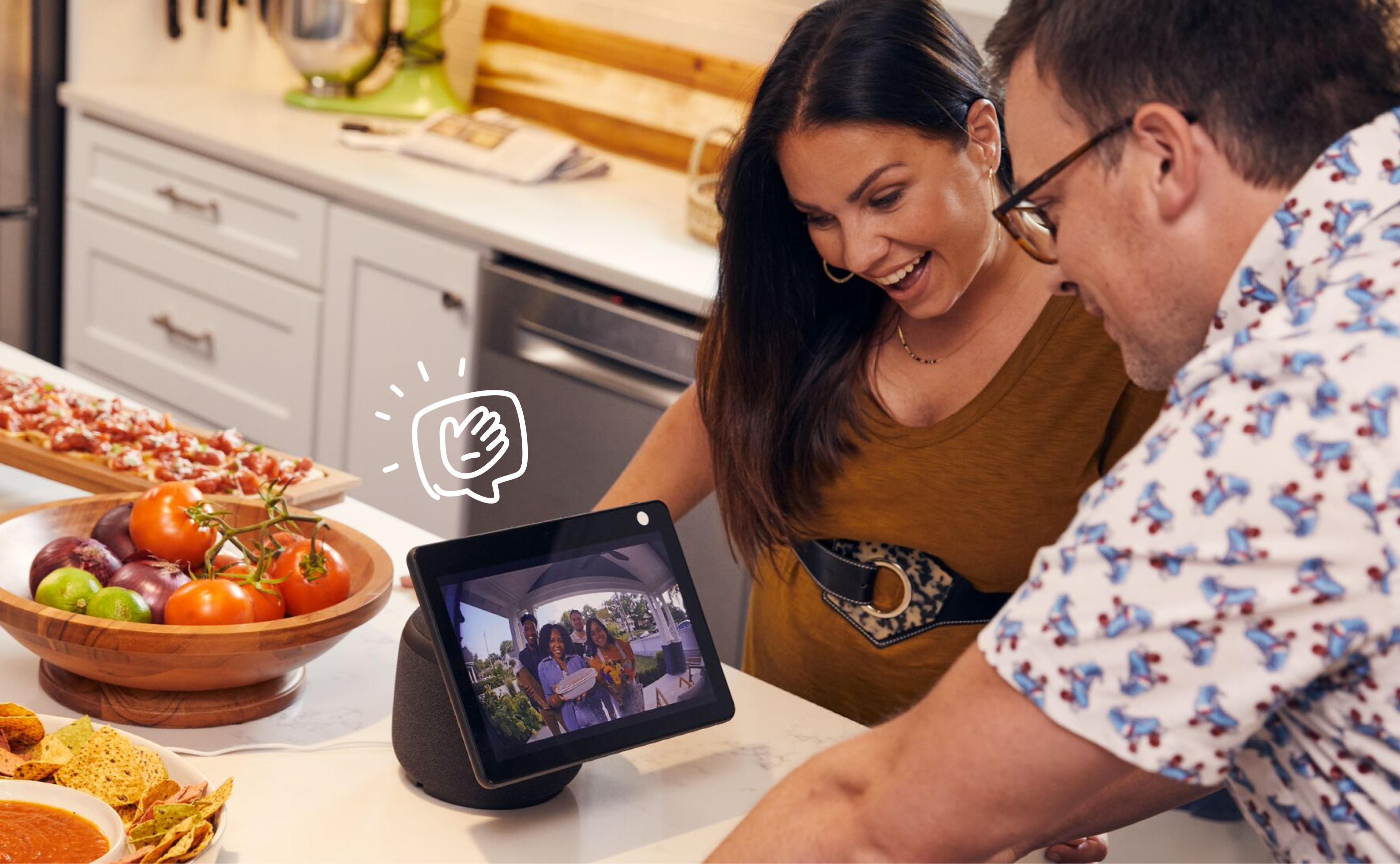If you've ever left home and gotten that nagging feeling you forgot to lock the front door, there's a simple device that can help: It's called a smart lock, and it's one of the best features of today's connected homes.
We know from experience. At Asurion, we fix, support, and protect your favorite tech—not just phones.
Here's our smart lock buying guide, including everything you want to know about these ingenious devices—from how much do smart locks cost to what types of smart locks you should consider.
What are smart locks and how do they work?
Smart locks are wireless devices that allow you to lock or unlock your door without a regular key. Most use Wi-Fi or Bluetooth® technology, but some use other wireless frequencies, like Z-Wave®. To control your smart lock, you can use a keypad, a fingerprint scanner, or an app.
These devices give you more options than a traditional lock and key. From anywhere, create temporary passcodes for pet sitters or visitors and set up alerts for when your door is locked or unlocked.
Are smart locks safe?
The answer is yes, but there are a few things to consider.
The average burglar will try to break into your home by picking your lock or by using a crowbar to pry open the door. Most smart locks are harder to crack than traditional locks.
A smart lock's keypad also doubles as a built-in backup system, so if a burglar tries to guess your access code, they'll be locked out after too many tries. Some models, like the Schlage Encode® Plus ($320), even come with a built-in alarm.
Yet smart locks aren't foolproof. Thieves can hack anything that connects to the internet, and smart locks often rely on the same Wi-Fi network you use for your phone, tablet, computer, and other tech. Setting up a secure home Wi-Fi network is crucial. Make sure to use strong passwords and keep your router up to date.

The devices we love aren’t cheap. Protect them with Asurion Home+.
We’ll cover your favorite home tech plus provide 24/7 live support, all for less than $1 per day.
What you should consider before buying a smart lock
Think a smart lock may be for you? Here are some things to consider before you buy one:
Cost
Depending on the features you want, smart locks cost anywhere from $100 to $500. Read reviews and beware of cheap locks from companies you've never heard of—they may be easy to pick or break.
If price matters most, consider a low-cost option with great features like the Yale® Assure Lock 2 ($160) or the August® Smart Lock + Connect ($199).
Style
Your smart lock must be compatible with your door and its locking mechanism. If you don't have a deadbolt, you can replace your doorknob with a model like the Ultraloq® Latch 5 Fingerprint smart lever lock ($199) or the Schlage Camelot Connected Keypad Door Lock with Accent Door Lever Featuring Flex Lock ($149).
Have a deadbolt? No problem.
- A deadbolt replacement. Swap out your traditional lock and key with a smart lock that fits into the same space, like the Ultraloq U-Bolt Pro Wi-Fi ($149).
- A deadbolt adapter. Replace your traditional lock with a smart lock that fits over an existing deadbolt, like the Wyze Lock Wi-Fi & Bluetooth Enabled Smart Door Lock ($129).
Trigger options
Consider how you want to lock and unlock your door. Along with your app, you can use a code, your fingerprint, your voice, or geo-fencing technology, which relies on your phone's location.
- Smart locks with fingerprint access, like the Kwikset® Halo Touch ($244) work well for families with kids who don't have cell phones.
- Models that use a code like the RemoteLock® OpenEdge 550L Lever Smart Lock ($269) are great for rental properties or if you've got lots of people coming and going.
- Want to use your voice to unlock your door or have your smart lock detect when you're nearby and open automatically? A model like the August Smart Lock Pro+ Connect ($229) will do both.
Compatibility
Make sure your smart lock is compatible with your phone and other connected devices in your smart home. If you've set up a smart home hub, for instance, you can control many smart locks at once along with your other connected tech. Imagine saying, “Hey Alexa, unlock the door, turn on the lights, turn up the heat." Cool, right?
- Amazon Alexa™ or Google Assistant™ work with many smart lock models, like the Ultraloq U-Bolt Pro Wi-Fi or the Schlage Encode Plus Smart Wi-Fi Deadbolt ($319).
- If you use Apple® HomeKit, there are fewer options, but a model like the Level Lock® Touch Edition ($399) will work.
- For Samsung® Smart Things compatibility, check out models like the Schlage Connect Smart Deadbolt ($199) or the Kwikset SmartCode 916 touchscreen smart lock ($299).
Power source
Smart locks get power from batteries, electricity, or a combination of both. Keep in mind that if you lose your internet connection, the electricity goes out in your home, your phone is lost or stolen, locking and unlocking your door will be tricky.
Many smart lock models come with a physical key, so keep it with you as a backup. You'll also need to remember to change your batteries.
Can I install a smart lock myself?
It depends. How handy are you? Smart locks that fit over existing deadbolts are relatively easy to install. You'll just need a screwdriver—it should take about 20 minutes—to remove the old hardware and install the new parts.
If you buy a new smart lock and need to install a lever, a doorknob, or a deadbolt for the first time, it'll take more time and effort. Consider reaching out to a smart home installation pro for help.
Make sure your smart home is protected
An Asurion Home+® protection plan provides coverage for nearly all the technology in your home with one simple plan. Laptops, tablets, TVs, gaming consoles, smart thermostats, and so much more—even future purchases. Plus, you'll get 24/7 live expert support and robust digital security. Learn more about Asurion Home+® coverage and how you can get peace-of-mind electronics protection.






